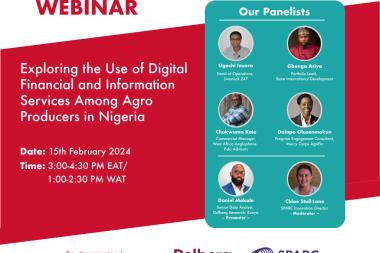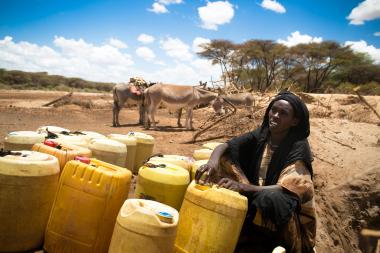Blog
Revolutionising producer livelihoods: opportunities for digital financial and information services to build resilience in Kenya
How can digital financial and information services support producer livelihoods in Kenya? This blog shares key highlights from a joint SPARC, Dalberg Research and Mercy Corps AgriFin webinar.
Publisher SPARC
The livelihoods of smallholder farmers and pastoralists in the drylands of Africa could be revolutionised through access to digital financial and information services, according to a study by Dalberg Research for SPARC and Mercy Corps AgriFin. The research report 'Access and Utilisation of Digital Financial Services and Digital Information Services among Smallholder Farmers, Pastoralists and Agropastoralists in Kenya' was launched during a recent webinar, hosted by Mercy Corps AgriFin, on 'Exploring the use of digital solutions for smallholder farmers and pastoralists in Kenya'.
Climate change is one of the main causes of agricultural shocks that farmers and pastoralists in Africa, and around the world, face. Smallholder farmers and pastoralists are significantly impacted by extreme climatic conditions, such as droughts and flooding. Climate variability can also lead to pest and disease outbreaks that affect various value chains, including those that cross national borders, and the communities whose jobs depend on them.
Our research on digital financial and information services highlighted the potential of digital tools to empower these rural communities, foster sustainable agriculture and pave the way for economic growth. This could ultimately ensure food security and prosperity in the agricultural sector in the face of climate change, and prolonged or recurrent crises.
The webinar, held in June, drew a broad cross section of participants, including researchers, policy makers, members of the for-profit and non-profit sectors, and representatives from the international development sector. They posed a range of questions to experts working in Kenya to discuss what more needs to be done to support smallholder farmers and pastoralists to access and use digital financial and information services:
Q1. How willing are farmers and pastoralists to pay for digital services? Has adoption been entirely voluntary, and which service bundles have been the most popular among producers and have proven to be effective?
Collins Marita, Director for Monitoring, Evaluation, Research, Accountability and Learning (MERAL) at Mercy Corps AgriFin, said: "Producers’ willingness to pay varies depending on the kind of digital service on offer. Our research shows that smallholder farmers and pastoralists are more willing to pay for financial services and less likely to pay for extension information such as guidance on livestock and crop diseases, and fertiliser use. Their appetite for the service increases with their level of awareness, and the evidence and the incentives they are given to adopt the given recommendations towards new practices.
"One of the biggest challenges producers face when taking up digital financial and information services is cost, mainly the amount of disposable income they have. Various incentives are offered to encourage uptake of the digital extension services. For example, recommended inputs are offered on credit using a voucher system, insurance is provided to protect the farmer and the credit provider from loss and information services to improve productivity.
"At Mercy Corps AgriFin, we are currently testing one such initiative, which is being implemented through our partners. In addition to receiving information, farmers are encouraged to take up soil-testing services to earn an improved credit score. This gives them more affordable access to inputs. We expect the results from this trial by the end of this year. From our experience, bundling digital services is vital as it leads to more farmers taking up these services and better outcomes. Providing a single service is inefficient and does not support farmers to solve the complex issues they face."

Q2. In this social media age, how can the risk of misinformation be controlled so that producers are not misled?
Samuel Karanja, Agriculture Manager, Mercy Corps AgriFin said: "Digital and social media platforms that farmers and pastoralists use, such as WhatsApp and Facebook, are fertile ground for people who polarise and spread conflicting explanations or solutions based on their alternative values. Traditional media, such as print, radio and television, provide gatekeeping functions through their editorial policies and practice. But social and digital media democratise the generation and distribution of, and access to, information. This allows people to be both producers and consumers of content with limited control.
"Producers use social media channels – such as X/Twitter and Facebook - and chat applications like WhatsApp and Telegram to share their questions, knowledge and experiences in thematic digital communities and groups, sharing expertise on specific subjects or practice areas. However, given the potential negative impact of misinformation in agri-food advisory communities of practice, strategies to detect and counter misinformation are essential.
"Like any other social media user, the farmer or pastoralist can only be advised to exercise due diligence by joining credible online communities that draw information from authenticated sources. Stakeholders in the agricultural sector must consider communications strategies that include running innovative and effective information campaigns to feed credible information into the social media space to reach the right audience.
"Producers are more likely to take up digital financial and information services that are recommended by trusted sources. Whether they consider agricultural extension workers to be trusted sources of information varies across settings. Extension workers may be perceived as a more objective source than agro-businesses, which may be seen to be profit-driven and, therefore, biased stakeholders. Our research proposes several solutions to this:
- Producer-facing stakeholders and organisations could prioritise digital agriculture advisory tools over third-party platforms like WhatsApp and Facebook groups. This would require these platforms to build more trust with producers than they have with friends and families. These organisations should consider working with qualified learning content providers and channels. These include Unstructured Supplementary Service Data (USSD), and Interactive Voice Response (IVR) systems and leveraging peer-referral networks that build on trust.
- Producer-facing organisations and stakeholders should partner with organisations that have complementary assets and provide credible and reliable content. Examples of these include the Kenya Agricultural and Livestock Research Organization (KALRO), and Sprout.
- Providers of digital financial and information services should consider working with government and religious institutions as strategic channels of information-sharing as they are generally trusted among farmers and pastoralists. The substance of the information and advisory services shared should be objective and demonstrate that the needs of the producers are the priority over company profits.
- Producers should seek multiple sources of information and triangulate the information they find as a means to test its veracity. These may include government sources, extension workers, non-profits, agro-dealers, peers and other producers."
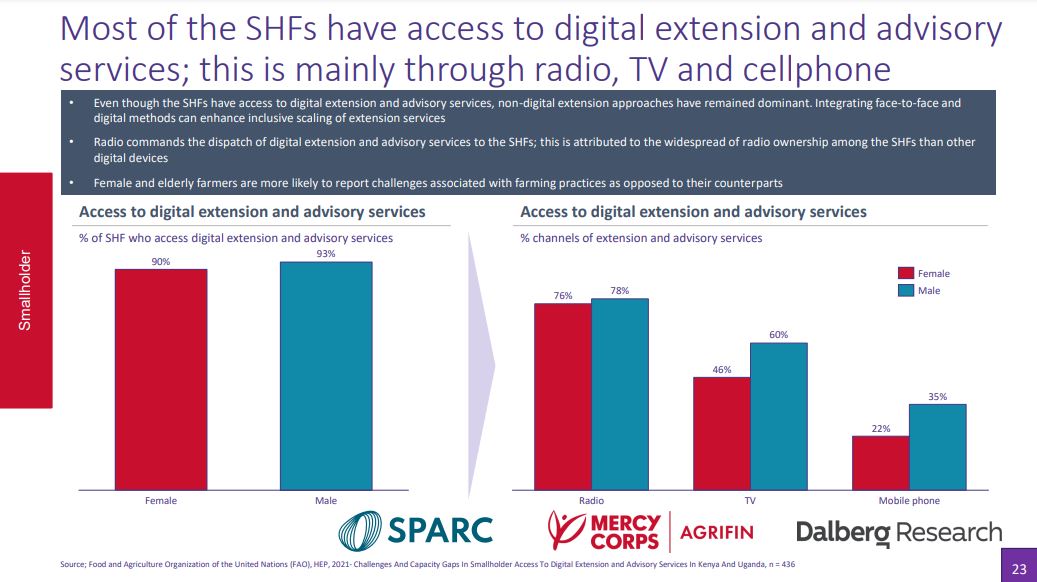
Q3. Sometimes pastoralists prefer to save in the form of assets, such as goats or sheep. What can your research show us about asset-based saving compared to mobile and cash savings?
A: Shadrack Munene, Senior Data Analyst, Dalberg Research said: "Most pastoral communities practise asset-based saving by default, either intentionally or not. Asset-based saving provides farmers, pastoralists and agro-pastoralists with a durable form of wealth that has the potential to provide them with a sustainable income since livestock can reproduce, despite economic fluctuations. This serves as an emergency fund during times of need. However, this practice leads to vulnerability to risks such as drought, disease, or theft, which can affect value due to fluctuating livestock market prices.
"On the other hand, mobile money and cash savings offer them immediate liquidity to meet day-to-day expenditure and can provide increased security. However, the effectiveness of mobile money is tied to how familiar farmers are with digital financial services and network coverage, which tends to be low in pastoral regions. This means that the choice of savings method they use depends on individual circumstances, risk appetite, access to financial services, network availability and personal preference."
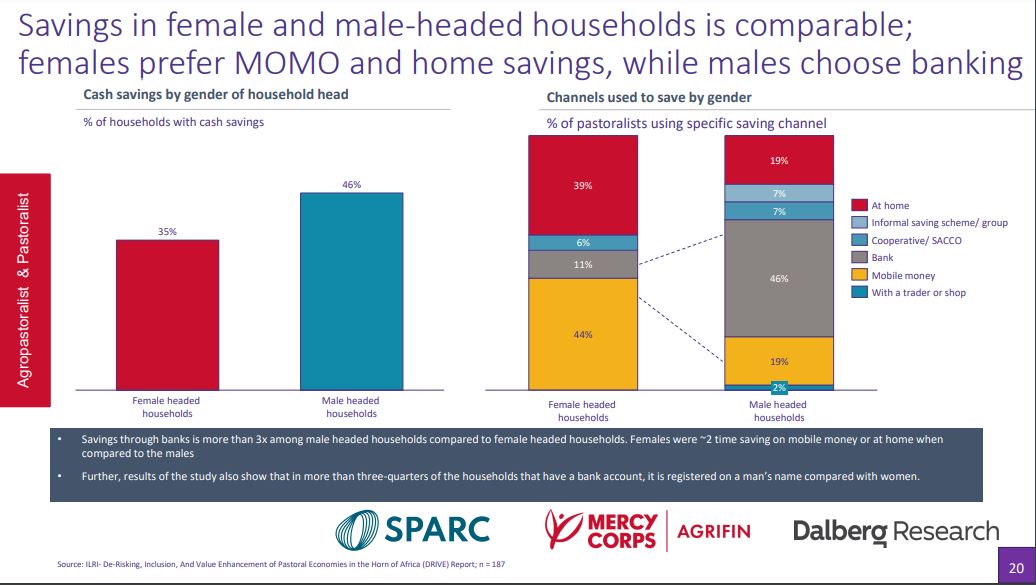
Q4: How many producers have you geo-referenced to-date in Kenya and how successful is the use of Digital Information Services to enhance pastoralism and farming in the larger arid areas of North Eastern Kenya?
A: Abdifatah Dakane, Programme Manager, Adaptation Services for Action and Learning (ASAL adapts), Mercy Corps said: "Government and policymakers in the counties of Garissa and Wajir are using geospatial technology for land use planning. This involves mapping rain-fed and irrigated agricultural areas being farmed/cultivated mainly by subsistence or smallholder farmers. The technology allows these areas to be systematically categorised based on different crop types and the level of production, providing producers with a comprehensive understanding of the agricultural landscape.
"The use of Geographic Information Systems (GIS) plays a vital role in participatory rangeland management. It enables the mapping of community rangeland resources, including seasonal grazing blocks, water resources, migratory routes, livestock markets, and areas prone to conflict. This spatial information is instrumental in effective rangelands planning, resource allocation and the implementation of development initiatives.
"Additionally, the counties are using the co-production of localised climate information services to enhance resilience. This involves working collaboratively with the public-private sector; the Meteorological Department, private organisations and development partners to develop and disseminate climate advisories tailored to the specific needs of drylands communities. Participatory scenario planning is also being embraced to ensure the inclusion of invaluable indigenous knowledge and perspectives. These efforts have established mechanisms for early warning and feedback systems, enabling communities to make informed decisions about their pastoralist practice and adapt to climate-related challenges.
"The use of geospatial technology in land use planning in Garissa and Wajir is revolutionising the way agricultural areas are mapped and managed. The integration of GIS in participatory rangeland management and the co-production of localised climate information services contribute to effective resource allocation and can support community resilience. These innovative approaches empower local communities and facilitate sustainable development in the face of climate change."
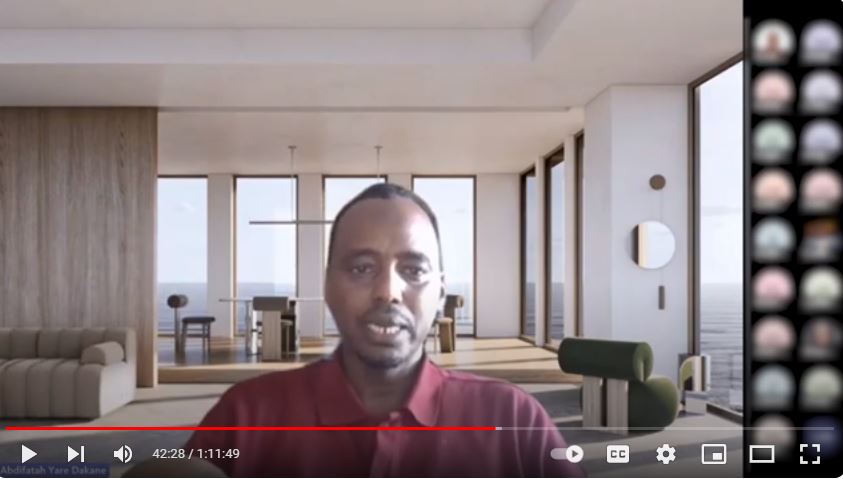
Watch the webinar on Kenya here:
Find out more about our research on access to and use of digital financial and information services in Ethiopia's drylands in this webinar here.
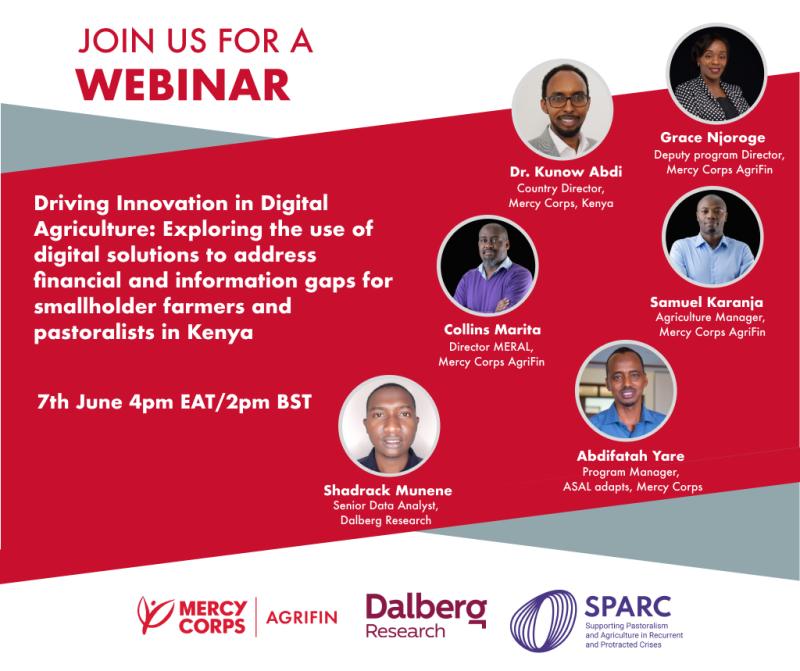
Credit Graphic by SPARC
